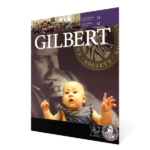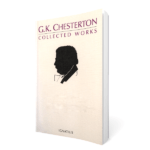Collected Works, Volume 10
Collected Poetry Part 3
The release of this volume should have been met with a flourish of trumpets in every literary journal in the world. It completed the collection of G.K. Chesterton’s poetry, three volumes which totaled over 1500 pages of poems, half of which almost no one had ever seen since they were first published in a long out-of-print paper or scribbled in a presentation copy of a book or sent in a letter and then folded and tucked away in a dusty drawer or, best of all, from a page of his early notebooks which had only been seen by Chesterton himself. It was a prodigious accomplishment, thanks to the scholarship and detective work of Denis Conlon and Aidan Mackey. Instead it went unnoticed. Forgive the ignorant fools who are the editors of those rags, for they know not what they do. Meanwhile, shame on the snobs who know better.
The third of the three parts of “Volume 10” of the Collected Works is, like its predecessors, a deep delight from the absurdity of the illustrated “Broad-minded Child’s Religious and Philosophical Alphabet” to the mysticism of “The Elevation,” describing that point in the Mass where the priest raises the consecrated host:
Lover of all men love, whose giant loving
Is so enlarged to love all little things;
Happy is he that to thine altar clings
We forget that Chesterton was in demand as a poet as much as essayist and a speaker, and most of his poems appeared in newspapers and magazines before they went on either to be collected (or unfortunately forgotten). “The March of the Black Mountain” was written for the Daily News as Chesterton was wading into the deeper waters of political controversy and reminding the world that daily decisions are not for the day alone:
What will there be to remember
Of us in the days to be?
Whose faith was a trodden ember
And even our doubts not free. . .
In “When I Came Back to Fleet Street,” the journalist-poet who had left London for Beaconsfield reveals his attachment to the country but his attraction to the city:
I had been long in meadows
And the trees took hold of me,
And the still towns in the beech-woods
Where men were meant to be.
But old things held; the laughter
The long unnatural night,
And all the truth they talk in hell,
And all the lies they write.
The volume includes some early poems that reveal that Chesterton is monotheistic without yet being Christian, the very process he will describe all societies going through in The Everlasting Man. Then, as his discovers Christ, we see a longing first for the baby in a manger, then the craftsman, then the teller of parables, and then the crucified one. (“But he was more than a god—he died.”) Ultimately, the poet reaches the Catholic Church, beautifully describing the moment in “The Convert.” Along the way is the complete version of the epic Ballad of the White Horse, with Denis Conlon’s insightful notes, which supplement any other version anywhere.
For Chesterton, every event is an occasion for poetry. He will take a line from a newspaper article or a critical essay and write a poem in response to it. The irony is that in following a poetic form, he can sometimes and somehow speak more freely than the prose writer who is not constrained by it.
Our middle class hold tea-cups when they call,
Our upper classes dine in evening dress,
Our lower classes never dine at all;
It is the secret of our happiness.
His parodies surpass their original objects, as in his stinging “Replies to the Poets,” his hilarious “To a Modern Poet,” and the absolutely brilliant variations on Old King Cole in the styles of Tennyson, Browning, Whitman, Yeats, and Swinburne.
His “throwaway” poems, personal inscriptions in books or lines dashed off on hotel stationary, the scattered stuff that has been recovered only through great efforts—these have proven to be permanent additions to the corpus. Most are witty lines betraying genuine affection, as in this unfinished ballade, written as an apology for breaking a wine-glass at a dinner:
Prince, when I took your goblet tall,
And smashed it with inebriate care,
I knew not how from Rome and Gaul
You gained it; I was unaware
It stood by Charlemagne’s great chair
And served St Peter at High Mass
. . . I’m sorry if the thing was rare,
I like the noise of breaking glass.
But some move beyond that. I think the most moving is a “Grand Triumphant Ode” written to Barbara Nicholl on the occasion of her 21st birthday. The Chestertons, who had no children of their own, developed a deep love for the three Nicholl girls and their widowed mother whom they befriended on a vacation in Lyme Regis. Chesterton’s ode is an amazing combination of shifting styles, puns, personal references, but ultimately a poignant, wistful sigh at watching a girl turn into a woman. The last stanza captures it all in a scene from the seaside where they first met:
But the Crier is crying
In Lyme of the King
Lost, Stolen or Strayed
Is the Marvellous Thing.
I will ring for the sea-gulls
That dance in the spray
But the girls that go dancing
Go dancing away,
The girls that go dancing,
Go dancing
go dancing,
The girls that go dancing
Go dancing away.


